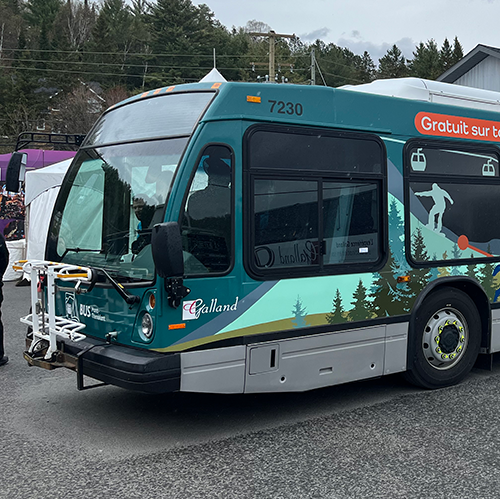Continue reading


The City of Mont-Tremblant has an environmental action plan (EAP) that includes a number of measures to reduce GHG emissions in the city, including emissions from public transit vehicles. As such, the municipality and Groupe Galland approached Énergir in 2022 to examine the suitability of buses powered by CNG (compressed natural gas).
“The City told us it wanted to look at renewable energy transportation solutions to help meet its decarbonization targets,” said Jean-François Maheux, Groupe Galland’s vice-president and managing director.
While CNG was one of the options Groupe Galland considered for its future vehicles, several other alternative energy sources were also on the table, including electricity.

“We had to demonstrate the benefits of the CNG to the customer and reassure them that the equipment we were proposing—both the buses and the refuelling station—were safe. Although these are the first CNG transit buses in Quebec, the technology is not new, and it is subject to strict manufacturing and installation codes,” said Sébastien Lajoie, energy expertise leader at Énergir’s DATECH Group.
After analysis and given the constraints specific to the Groupe Galland’s activities, particularly in terms of autonomy and reducing fossil GHG emissions, CNG was ultimately chosen. “Our buses must provide 14 hours of continuous service every day and electric vehicles, while promising, did not meet our needs in that regard,” said Mr. Maheux. In addition, some other technologies—such as low-carbon hydrogen and hybrid propulsion—were not sufficiently mature or decarbonized to be viable for Groupe Galland.
To further reduce GHG emissions from its future buses, the client purchased the equivalent of 100% RNG molecules. Énergir also presented a preliminary design and pro forma financial model for a compressor station connected to the gas distribution system. Once the CRNG bus project was approved, Énergir’s partners built this station for Groupe Galland in Mont-Blanc, and the DATECH team conducted a safety inspection before it opened.
Initially meant to refuel Groupe Galland vehicles, the station was redesigned for public refuelling and will eventually allow CNG-powered heavy trucks to refuel between Val-d’Or and Montreal.
“This is a positive collateral effect of Groupe Galland’s initiative. This CNG station originally planned for buses in the Upper Laurentians expands the public refuelling station network and fosters the transition from diesel to CNG, a fuel that emits less GHGs and fine particles when burned,” said Sébastien Lajoie.

The financial package presented by Énergir and its representative Francisco Doyon also highlighted some of the savings of natural gas motorization that companies wishing to acquire CNG vehicles should consider. “Fossil CNG is a cheaper fuel than diesel on a calorific value basis. However, the vehicles themselves are more expensive, particularly because of the on-board CNG tanks—something to consider when calculating the return on investment (ROI) period,” said Sébastien Lajoie.
Fossil natural gas and Renewable natural gas are also interchangeable, so a truck transport company committed to reducing its fossil GHG emissions can purchase Renewable gas dedicated for some of its vehicles fleet and CNG for others using the same CNG station.
“What’s important is to sign a purchase agreement for a sufficient volume of RNG to meet your needs and help meet the decarbonization targets,” said Lajoie.
To better understand how the RNG Énergir sells helps improve the fossil GHG balance of the companies that purchase it, please see the box opposite.
With regard to the environmental record, Groupe Galland expects encouraging results. “We haven’t crunched the numbers yet, but by replacing about 220,000 litres of diesel over the year with the equivalent in CNG and RNG contracted, we expect a significant reduction in our fossil GHG emissions,” said Jean-François Maheux, adding that the company will soon perform a detailed analysis. Encouraged by this initial experience, Groupe Galland intends to acquire new CNG buses. “Sustainable development is a priority for us, and we continue to explore options to meet our business needs while reducing our environmental footprint,” he said.
As for the relationship with Énergir, Mr. Maheux has nothing but good things to say:
“Working with Énergir has been very positive. The company’s expertise, support and many industry contacts have been essential for us in pursuing this energy transition. Énergir supported us every step of the way in integrating CNG into our fleet.”
If, like Groupe Galland, you’re interested in converting some or all of your fleet to CNG, contact Francisco Doyon at [email protected]. We look forward to helping you find the best solutions for your operational, financial and environmental needs.
|
When you purchase renewable natural gas (RNG), you’re helping to improve your company’s fossil GHG balance, because your purchase of RNG replaces the purchase of an equivalent amount of fossil natural gas. While we cannot necessarily deliver to you the RNG purchased, your share is contractually attributed to you and is reflected on your bill. Your purchase of RNG helps improve your GHG balance by reducing the GHG emissions targeted by the fight against climate change.
|
Sébastien Lajoie, Eng.
Leader, Energy Expertise
Philippe Deveaux, Eng.
Assistant Advisor, Energy Expertise
Continue reading
© 2024, Énergir